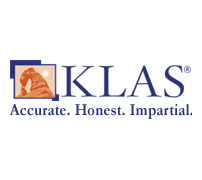by
Barbara Kram, Editor | October 01, 2008
Orem, UT - Since medication manufacturers are not required to place a barcode label on each unit dose, healthcare provider organizations have sought cost-effective methods to acquire unit dose drugs with barcodes. Drug suppliers usually offer to affix barcode labels to selected medications for an additional fee. While considered a convenient solution, larger hospitals often find this to be prohibitively costly for certain medications needed in very high volumes, and so have decided to buy in bulk and package unit dose medications with barcodes themselves.
KLAS found in its 2008 High-Volume Unit Dose Packaging study that the experience has been mixed for the organizations that have adopted unit dose packaging systems. At hospitals dispensing a high volume of doses, which tend to be larger hospitals, many believed that the unit dose packager was able to help them reduce overall costs and enabled the organization to better control an essential aspect of the medication administration cycle.
Due to lower volumes, a number of provider organizations questioned whether or not their unit dose packaging system was worth the investment. Some hospitals, in retrospect, felt their volumes were too low to justify the purchase of a unit dose packager given the number of doses they package and the amount of care and feeding that one of these machines typically requires.



Ad Statistics
Times Displayed: 132049
Times Visited: 7482 MIT labs, experts in Multi-Vendor component level repair of: MRI Coils, RF amplifiers, Gradient Amplifiers Contrast Media Injectors. System repairs, sub-assembly repairs, component level repairs, refurbish/calibrate. info@mitlabsusa.com/+1 (305) 470-8013
Implementation is frequently mentioned as an area of frustration for unit dose packager customers. It was reported that many of the installation personnel have little experience implementing this equipment. Contributing to these implementation issues is the difficulty of interfacing within an automated pharmacy environment. Beyond implementation, there are significant operational and maintenance issues to contend with. Respondents made a point of stating that client organizations cannot just start the packager and then leave it to operate.
Client organizations stressed the need to check the integrity of the packager's work. Some respondents reported cases where more than one pill was mistakenly dropped into the unit dose package. In other instances, a pill was lodged in the workings of the machinery and later jostled free only to drop into another medication's package. To deal with these medication and maintenance issues, many client organizations have seen fit to dedicate a full-time employee to the care and feeding of the equipment. At times, a type of superuser who is versed not only on the packager, but also in the organization's overall medication administration process has been touted as a huge benefit for organizations that have adopted packaging technology.
Vendors included in this report are AmerisourceBergen Technology Group (ABTG), McKesson, Omnicell, Swisslog, and Talyst. This research represents the experiences of more than 130 healthcare provider professionals.
About KLAS
KLAS is a research firm specializing in monitoring and reporting the performance of healthcare vendors. KLAS' mission is to improve delivery, by independently measuring vendor performance for the benefit of our healthcare provider partners, consultants, investors, and vendors. Working together with executives from over 4500 hospitals and over 2500 clinics, KLAS delivers timely reports, trends, and statistics, which provide a solid overview of vendor performance in the industry. KLAS measures performance of software, professional services, and medical equipment vendors. For more information, go to www.KLASresearch.com, email marketing(at)KLASresearch.com, or call 1-800-920-4109 to speak with a KLAS representative.

